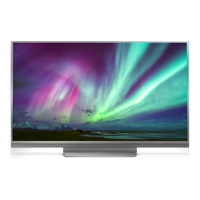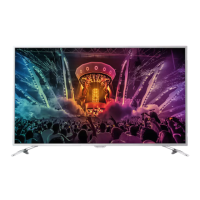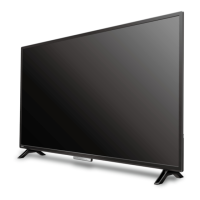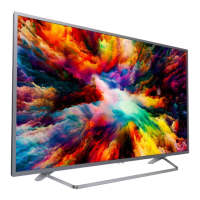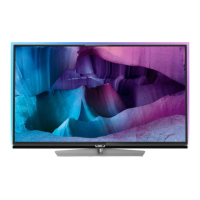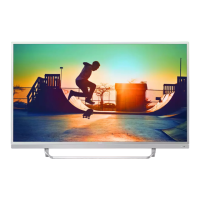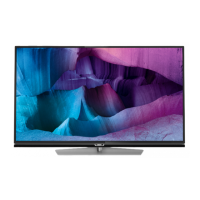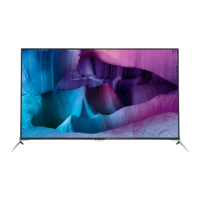Do you have a question about the Philips 8901 SERIES and is the answer not in the manual?
Explains the Ultra HD display and its resolution capabilities.
Describes the Ambilight Projection feature and its immersive experience.
Introduces the TV as a Philips Android TV with UHD features.
Explains how to watch TV channels, use favorite lists, and access program recommendations.
Details how to use apps from Philips App Gallery and Google Play Store.
Describes the TV as a platform for gaming, including console and app games.
Explains how to rent movies via Video on Demand services.
Explains how to pause and record TV broadcasts using a USB hard drive.
Guides on sharing content from smartphones and tablets to the TV.
Explains how to connect wireless speakers or headphones via Bluetooth.
Advises reading safety instructions before using the TV.
Guides on mounting the TV stand using the Quick Start Guide.
Provides tips for optimal TV placement regarding light and viewing distance.
Instructions on connecting the power cable and safety precautions.
Explains how to connect the antenna cable for TV signal reception.
Advises on seeking expert help for satellite dish setup due to potential complexity.
Guides on connecting the TV to a home network wirelessly or via a wired connection.
Explains the benefits of signing in with a Google Account for full TV capabilities.
Introduces the Philips App Gallery for downloading TV apps.
Provides a guide on connecting various devices to the TV for optimal quality.
Details the use of a CAM module with a smart card for conditional access.
Instructions for connecting a receiver or set-top box via antenna or SCART.
Guides on connecting a Home Theatre System using HDMI ARC for audio.
Explains connecting smartphones and tablets via wireless or wired connections.
Instructions for connecting a Blu-ray Disc player using HDMI.
Guides on connecting a DVD player via HDMI or SCART.
Explains connecting Bluetooth devices like speakers and gamepads.
Instructions on connecting headphones to the TV's audio jack.
Details connecting game consoles via HDMI, YPbPr, or SCART.
Guides on connecting gamepads, including wireless and Bluetooth options.
Instructions on how to switch the TV on, put it in standby, or switch it off.
How to adjust or switch off the brightness of the Philips logo.
Explains how to use the TV's joystick key for basic operations without the remote.
How to set the Sleep Timer for automatic TV standby.
Explains how to deactivate the automatic switch-off timer.
Provides an overview of the remote control's buttons and their functions.
Explains the functionality and usage of the remote control's touch pad.
Details how to use voice commands for searching and controlling the TV.
Explains how to use the remote control's keyboard for text input.
Guides on how to pair the remote control with the TV for RF communication.
Mentions the IR sensor for remote control usage.
Instructions for replacing the remote control's batteries.
Advice on how to clean the remote control properly.
Explains how channels are displayed, filtered, and managed in channel lists.
Instructions on tuning to channels, locking them, and setting parental ratings.
Guides on creating, renaming, and reordering favourite channel lists.
Explains how to open, navigate, and use Teletext pages.
Introduces interactive TV services like HbbTV and MHEG.
Explains what is needed to view the TV Guide and its features.
Details the sources for TV Guide information and how it's collected.
Instructions on opening, navigating, and using the TV Guide for programs.
Explains how to record TV programs, schedule recordings, and manage recordings.
Details how to pause and resume live TV broadcasts and replay content.
Introduces Top Picks for recommended TV programs and online services.
Explains the Now on TV feature for discovering current popular programs.
Describes TV on Demand services for watching missed or favorite programs.
Information on renting movies from online video stores.
Introduces the Home menu as the TV's central hub for apps, channels, and devices.
Instructions on how to open the Home menu and navigate its items.
Explains how to use voice commands and the remote keyboard for searching.
Guides on setting up a restricted profile to limit app usage.
Explains the TV Menu as an alternative to the Home menu for TV functions.
Instructions on how to open the TV Menu and access its items.
How to switch between different TV inputs and devices.
Setting specific options for connected TV input devices.
How to assign names and icons to connected devices for easier identification.
Setting the TV to ideal modes for gaming or computer use.
How to rescan TV connections to update the Sources menu.
Explains where to find installed apps and their functions on the TV.
Guides on using Google Play Movies & TV, Music, and Games.
Instructions for installing apps from the Philips App Gallery.
How to start or stop an application from the Home menu.
Instructions on locking 18+ rated apps or setting up a restricted profile.
Guides on stopping, clearing cache, or uninstalling apps.
How to check TV memory usage and available storage space.
Requirements for playing games, including internet connection and app installation.
Information on connecting compatible wireless gamepads for gaming.
How to start games from the Home menu or a connected game console.
How the TV automatically adjusts settings for gaming.
Instructions on how to start the TV's internet browser.
Explains available internet browser options like favorites and zoom.
How to view media files from a connected USB flash drive or hard drive.
Guides on playing media files from a computer or NAS via a home network.
How to access and play media from cloud storage services.
Instructions on playing video files from various media sources.
Information on using the Philips TV Remote App for controlling the TV.
How to cast apps and content from mobile devices to the TV.
Adding AirPlay functionality to the Android TV.
Connecting MHL-compliant mobile devices to the TV for screen sharing and charging.
How to set Ambilight to follow video, audio, or use preset colour styles.
Adjusting the size of the Ambilight halo effect.
Instructions on how to switch off the Ambilight feature.
General settings related to Ambilight customization.
How to watch a second program in a small screen alongside the main one.
Watching a TV channel in a small screen while viewing Text (Teletext).
Accessing commonly used settings through the Frequent Settings menu.
Adjusting picture settings like Quick Setting, Picture Style, and Format.
Adjusting sound settings including Sound Style, Bass, Treble, and Surround Mode.
Settings for Ambilight styles, halo size, and brightness.
Managing energy-saving features like Energy Saving and Screen Off.
Various general settings including logo brightness and location.
Settings for menu language, subtitle, audio preferences, and clock.
Features for deaf, hard of hearing, or visually impaired users.
Setting parental ratings, app locks, and PIN codes for child safety.
Settings for network connections and Bluetooth devices.
Configuring Android-specific settings and app information.
Instructions for automatic and manual channel updates and reinstallation.
Guides on installing satellites, including Unicable and MDU systems.
Procedures for updating TV software via Internet or USB.
How to view the current TV software version and release notes.
Information regarding the open source software used in the TV.
Details on the open source licenses applicable to the TV's software.
How to receive announcements about new TV software or related issues.
Information on the European Energy Label and product disposal.
Details on the TV's power specifications, including mains power and ambient temperature.
Technical specifications like energy efficiency, screen size, and resolution.
Specifies the Android OS version running on the TV.
Details on tuner bands, DVB standards, and video/audio playback support.
Information on screen type, diagonal size, resolution, and input resolutions.
Physical dimensions and weight of the TV.
Lists all available TV connectivity ports and slots.
Details on the TV's sound specifications like output power and technology.
Information on supported multimedia connections and playback formats.
Benefits of registering the TV and where to do it.
How to access and use the on-screen help system.
Solutions for common TV problems like no power or unresponsive remote.
Important safety instructions regarding electric shock, fire, injury, and overheating.
Guidelines for safely cleaning the TV screen and Ambilight LEDs.
General terms and conditions for using the TV.
Terms of use specific to the Philips App Gallery.
Copyright information for HDMI technology.
Copyright information for MHL technology.
Copyright information for Dolby technologies.
Copyright information for DTS Premium Sound.
Copyright information for Wi-Fi Alliance.
Copyright information for Microsoft technologies like Windows Media and PlayReady.
Mentions other registered and unregistered trademarks.
| Resolution | 3840 x 2160 (4K UHD) |
|---|---|
| Processor | P5 Perfect Picture Engine |
| Operating System | Android TV |
| HDMI Ports | 4 |
| USB Ports | 3 |
| Smart TV | Yes |
| Refresh Rate | 120 Hz |
| Bluetooth | Yes |
| Wi-Fi | Yes |
| Sound Output | 50W |
| HDR Support | HDR10+, Dolby Vision |
